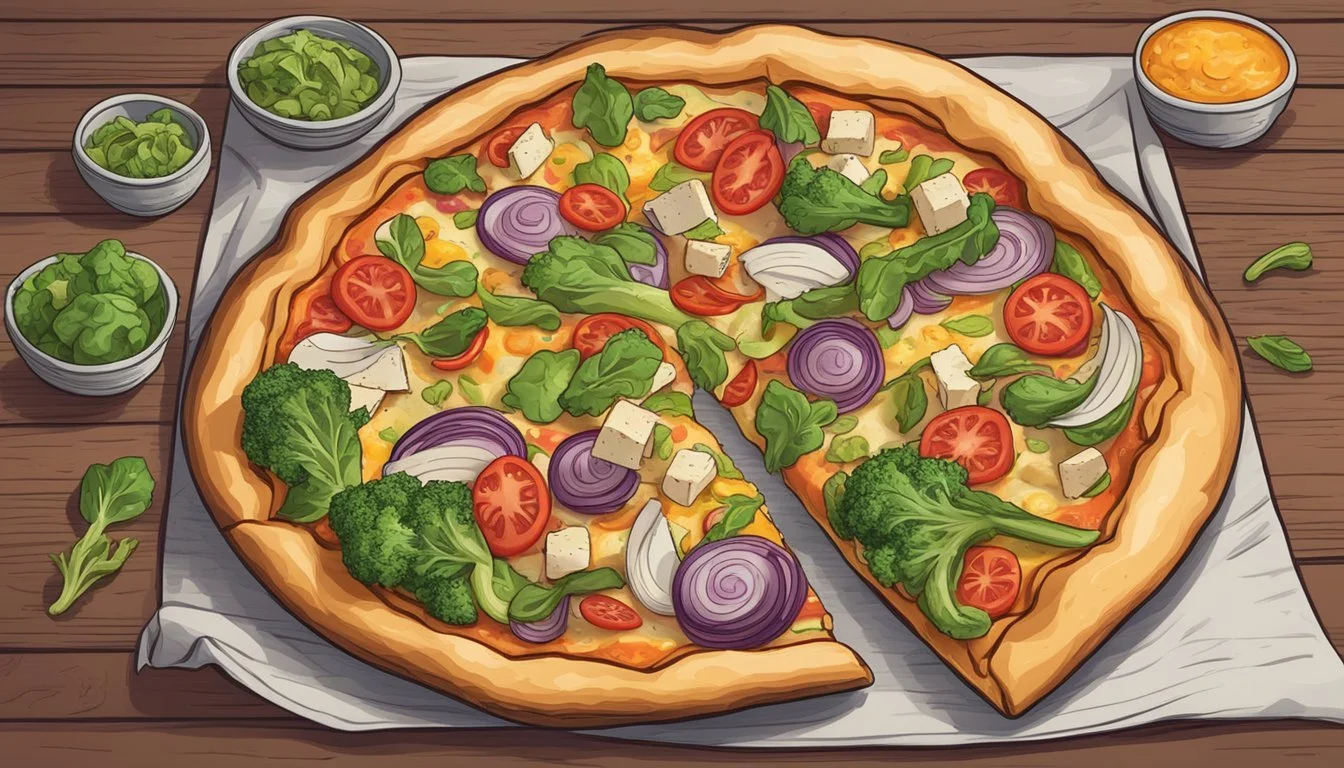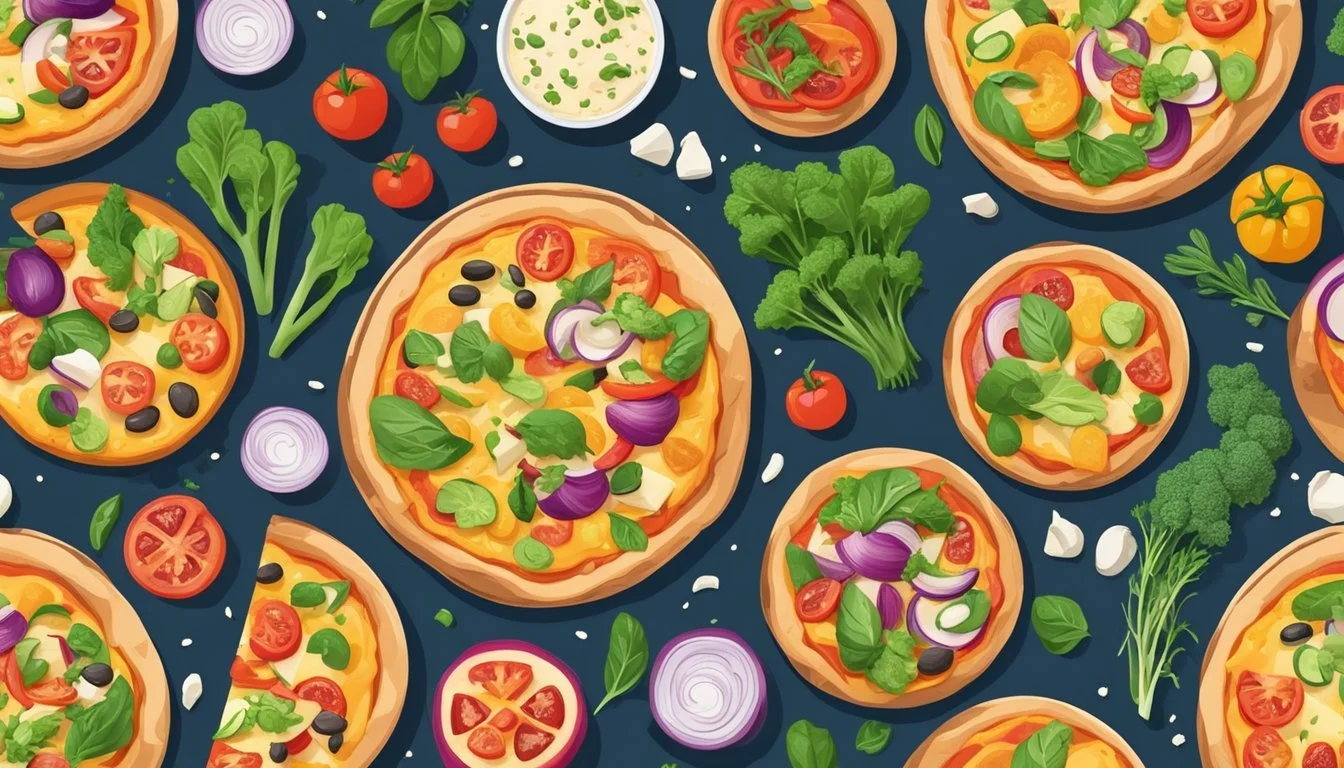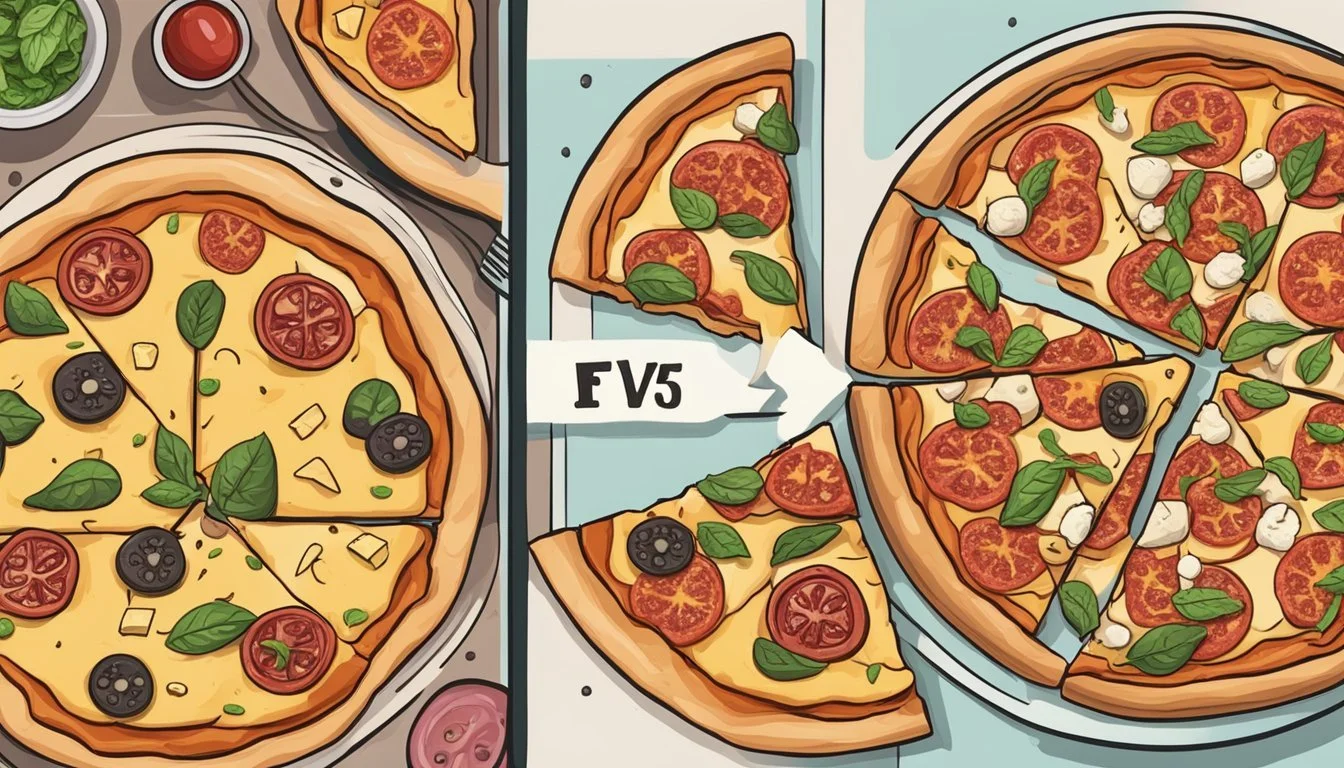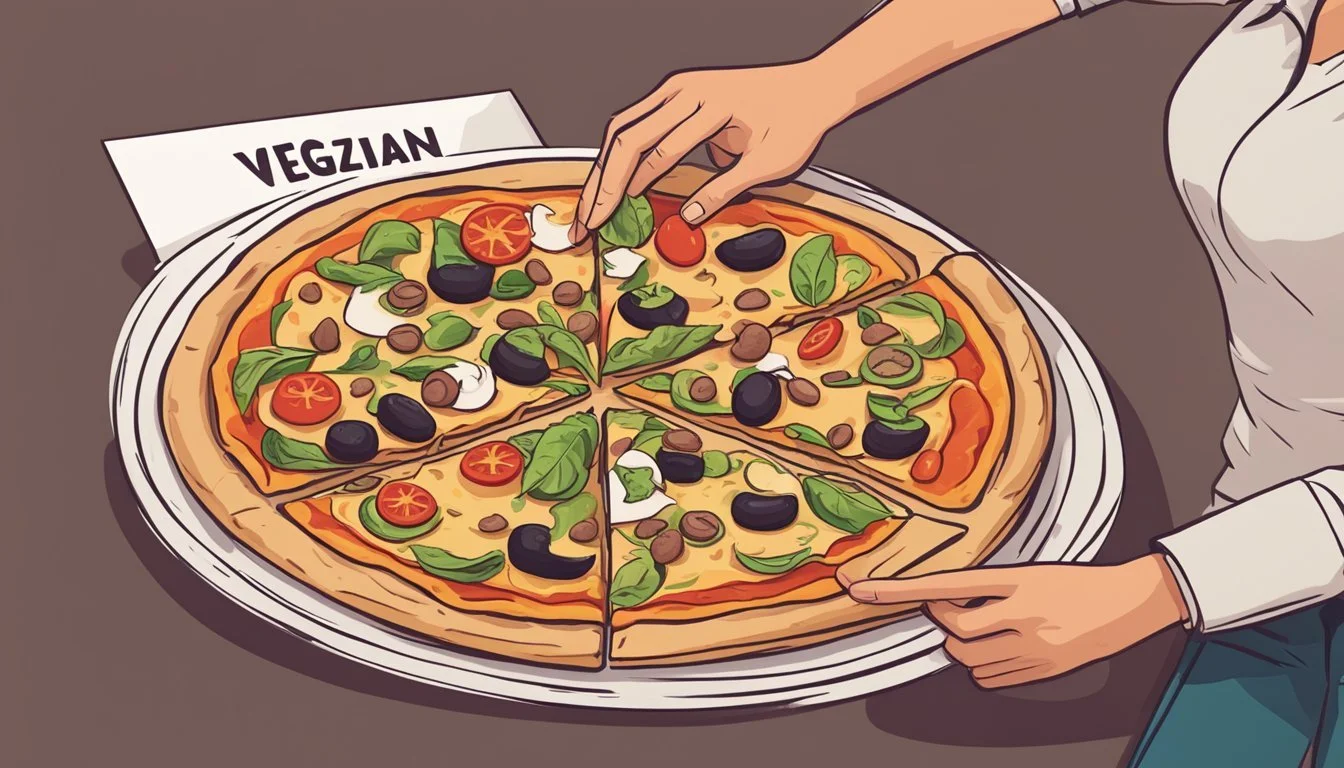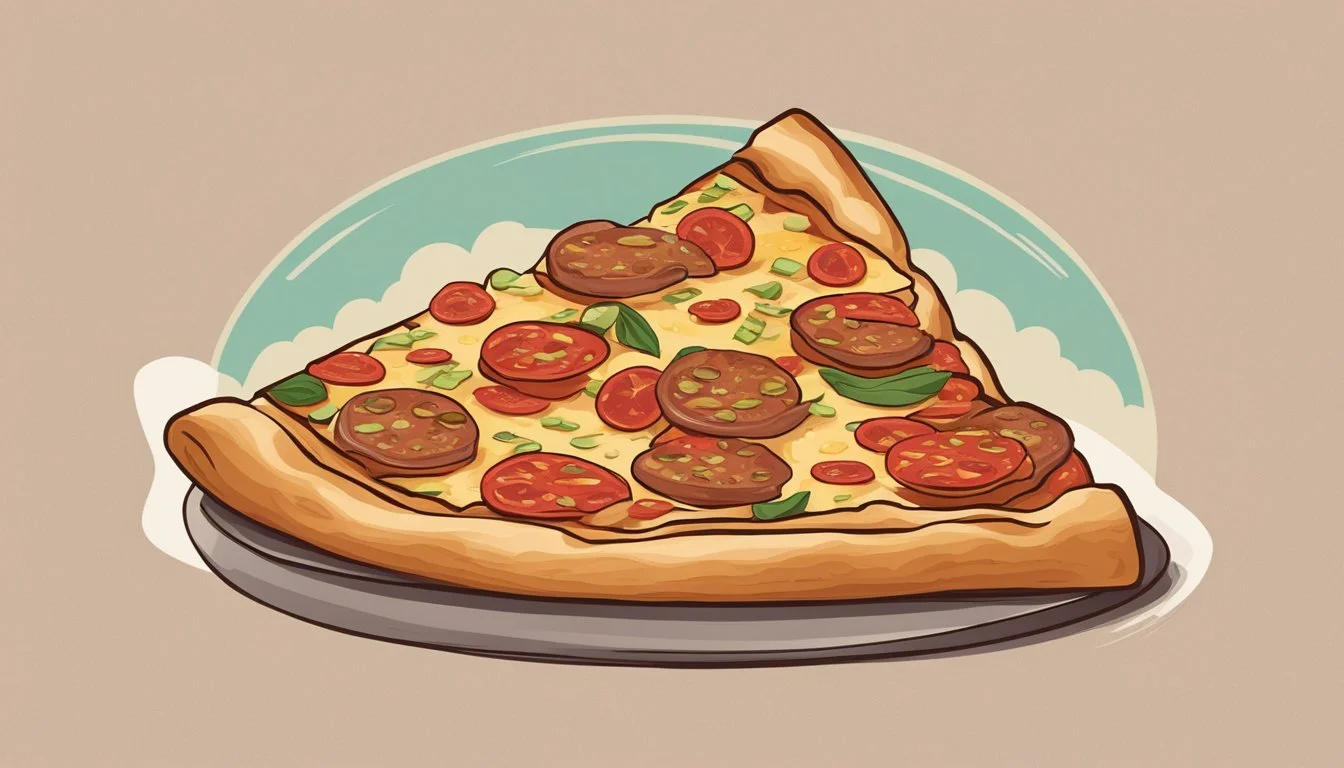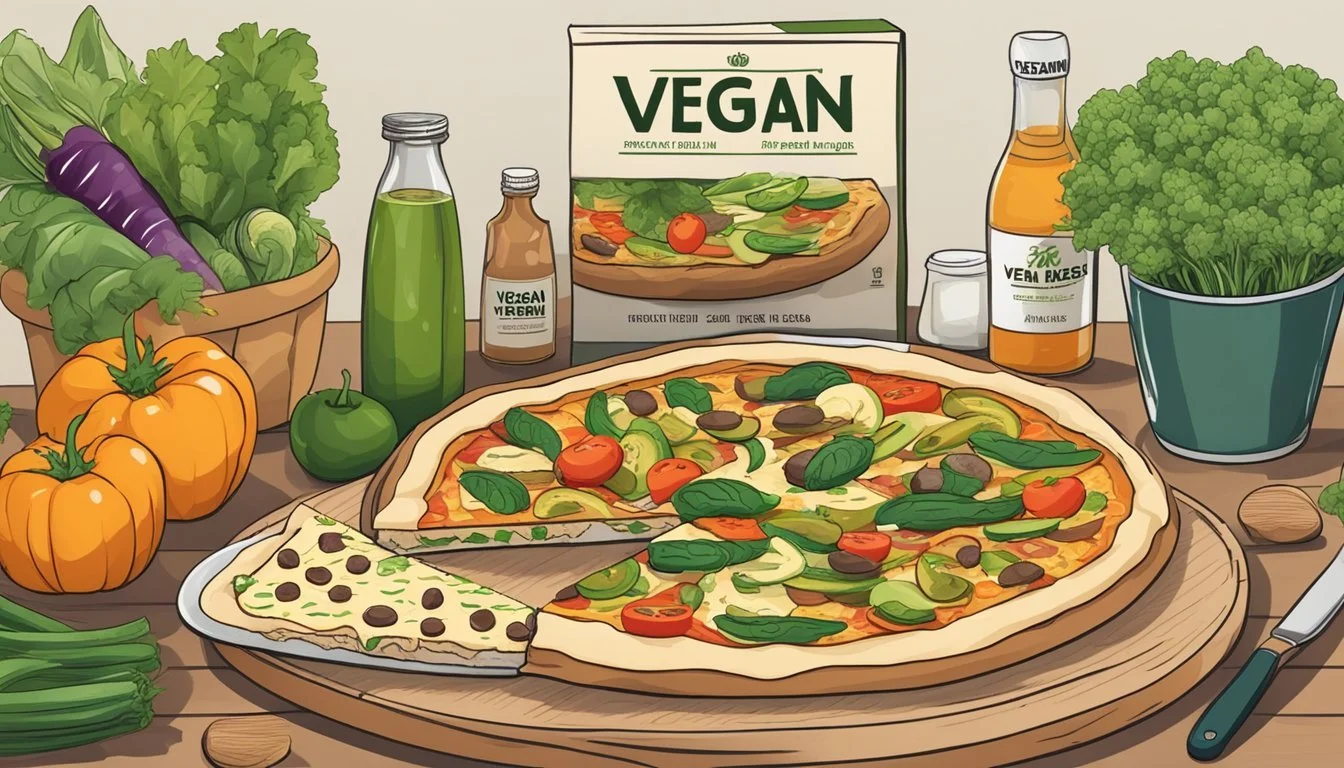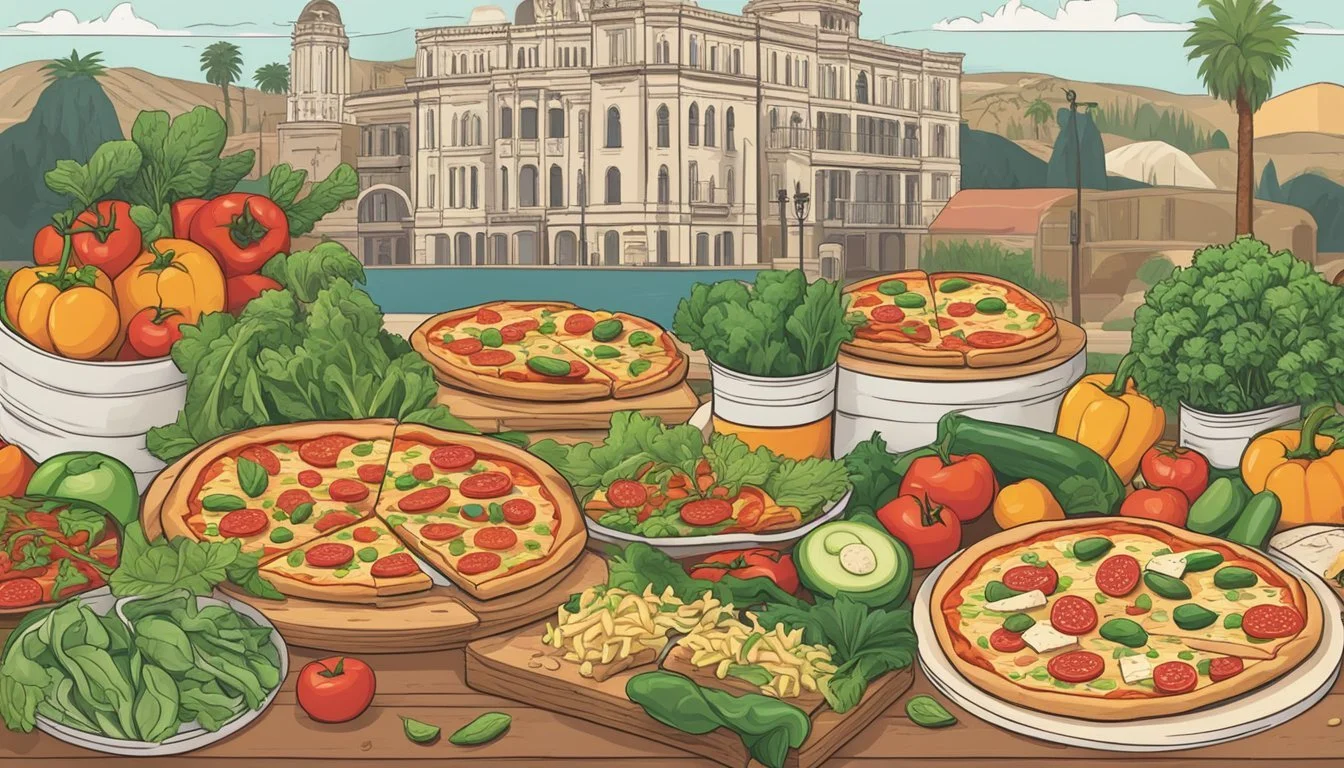Is Californian Pizza Vegan?
Unpacking the Ingredients and Options
California Pizza (What wine goes well with pizza?) Kitchen offers several vegan options for those dining with plant-based preferences, responding to the growing demand for vegan-friendly menus. Traditionally, pizza is not vegan as it often includes cheese and sometimes meats or other non-vegan toppings. However, Californian pizza chains like California Pizza Kitchen have adapted, allowing customers to modify their orders to fit a vegan diet. For instance, a vegan can order a California Veggie Pizza without cheese, enjoying a mix of broccolini, eggplant, (What wine goes well with eggplant?) mushrooms (What wine goes well with mushrooms?), sun-dried tomatoes, roasted corn, and red onions.
Ordering vegan at California Pizza Kitchen can indeed be straightforward, with clear adjustments like omitting all cheeses and ensuring that none of the dressings or sauces contain animal products. Beyond pizza, the menu has options such as fresh fruit bowls and tomato basil spaghetti that are vegan by nature. As menus continue to evolve, it's advisable for vegans to verify ingredient lists to ensure that the dishes meet their dietary standards, since restaurants may change their offerings or recipes.
What is Californian Pizza?
Californian Pizza emerges as a unique fusion of diverse flavors, embracing both the classical and experimental aspects of pizza-making. It represents an innovative culinary trend that departs from traditional Italian roots by incorporating fresh and often unconventional ingredients.
Defining Characteristics
Californian Pizza is characterized by its crispy thin crust which serves as a light canvas for a plethora of creative toppings. Unlike the more traditional, heavily sauced and cheese-laden versions, Californian Pizza tends to focus on the balance of flavors and often features a more health-conscious approach. The style is synonymous with avant-garde toppings that might include anything from global cuisines.
Key Ingredients
The foundational elements of Californian Pizza hinge on the use of fresh and high-quality ingredients. A typical Californian Pizza might forgo the classic tomato sauce for alternatives such as olive oil or a variety of other sauces. Key signature pizzas include:
California Veggie Pizza: Often adorned with broccolini, eggplant, cremini mushrooms, sun-dried tomatoes, roasted corn, and red onions.
Wild Mushroom Pizza: Highlighting an assortment of mushrooms like cremini and shiitake, coupled with garlic, extra virgin olive oil, and scallions.
Plant-Based BBQ Chicken Pizza: Drizzled with BBQ sauce, topped with plant-based chicken, red onions, and fresh cilantro for those seeking a vegan option.
These pizzas illustrate Californian Pizza's ability to offer a range of flavors that cater to various dietary preferences, including vegan alternatives without sacrificing taste.
Veganism and Diet
Within the context of a diet, veganism emphasizes the exclusion of all animal products and by-products. Understanding the basics of a vegan diet and how traditional recipes can be adapted is vital for those seeking to maintain a vegan lifestyle or to cater to vegan dietary preferences.
The Vegan Diet Basics
A vegan diet consists exclusively of plant-based foods, avoiding meat, dairy, eggs, and other animal-derived substances. Individuals who follow this diet choose alternatives rich in essential nutrients to ensure a balanced intake. Protein, a macronutrient often associated with animal products, is instead sourced from plants such as lentils, chickpeas, tofu, and various nuts and seeds. A well-planned vegan diet can meet all the nutritional needs of an individual when careful attention is paid to the variety and preparation of meals.
Nutrient Plant-based Sources Protein Beans, lentils, tofu, nuts, seeds, quinoa Calcium Fortified plant milks, leafy greens, almonds, tahini Iron Legumes, oats, raisins, pumpkin seeds B12 Fortified foods, supplements
Vegan Substitutes in Traditional Recipes
Traditional recipes often include meat, dairy, and other animal-derived ingredients, but they can often be made vegan-friendly through substitutions. Vegan cheese is now widely available and can be used in place of dairy cheese, derived from various plant sources such as nuts, soy, and root vegetables. Butter can be replaced with plant oils or vegan butters, and milk can be substituted with plant-based alternatives like almond, soy, oat, or coconut milk. Such substitutions can make a dish vegan without compromising on flavor or texture.
For example, a pizza that typically contains cheese and possibly meat toppings can be adapted using:
Vegan cheese made from cashews or other nuts,
Meat substitutes like seasoned tempeh or tofu,
A diversity of vegetables for added flavor and nutrition.
It is essential to note that while many establishments are expanding their menus to include vegan options, not all are equipped to provide fully vegan dishes. Consumers often need to request customizations to plant-based menu items to ensure they align with vegan standards.
California Pizza Kitchen Overview
California Pizza Kitchen (CPK), known for its innovative and non-traditional pizzas, has become a household name in offering a variety of menu options to cater to a wide range of dietary preferences, including vegan choices.
History and Expansion
California Pizza Kitchen was established in 1985 by attorneys Rick Rosenfield and Larry Flax in Beverly Hills, California. The restaurant quickly grew in popularity due to its unique take on pizzas, using flavors and ingredients from around the world. Since its inception, CPK has expanded internationally, spreading its brand to over 250 locations across various countries. The restaurant prides itself on its ability to innovate and adapt, which includes embracing diverse dietary needs such as veganism.
Menu Diversity and Options
The CPK menu showcases a diversity of dishes, from appetizers (What wine goes well with appetizers?) to desserts, offering something for everyone, including those with specific dietary requirements. For vegan guests, CPK provides a selection of menu items:
Appetizers: Options like White Corn Guacamole + Chips bring a vegan-friendly start to the meal.
Salads: Guests can enjoy salads like the Roasted Veggie Salad, making sure to omit the dressing.
Pizzas: A variety of pizzas such as the California Veggie or Wild Mushroom can be ordered without cheese for a vegan treat.
Pastas: Dishes like the Tomato Basil Spaghetti are available, staying in line with vegan standards.
For those with children, the kids menu includes items like Fusilli with Tomato Sauce, ensuring that vegan options are accessible for all ages. CPK’s engagement with diverse dietary preferences solidifies its place in the modern culinary landscape.
Vegan Choices at California Pizza Kitchen
California Pizza Kitchen offers an assortment of vegan options on its menu, ranging from appetizers to main dishes. They also provide the flexibility to customize dishes to cater to vegan preferences.
Vegan-Friendly Menu Items
Appetizers:
Fresh Fruit: A combination of pineapples and red seedless grapes.
Smashed Avocado Focaccia: Omit any non-vegan ingredients upon request.
Lettuce Wraps: Opt for Chinese vegetables only.
Salads: Note: Omit the dressing or choose oil and vinegar to ensure vegan compatibility.
Roasted Veggie Salad: Skip the dressing.
Soups:
Dakota Smashed Pea + Barley Soup: Made without any animal products.
Main Dishes:
California Veggie Pizza: Order without cheese for a vegan option.
Tomato Basil Spaghetti: Fresh tomatoes and basil, request no cheese.
Customizing for Vegan Preferences
Customization options provide additional variety for those following a plant-based diet:
Pizza: Select the cauliflower crust and request no cheese. Top with preferred vegetables.
Power Bowl: Choose ingredients that are free of animal products.
Salad Dressings: Opt for oil and vinegar instead of creamy dressings.
Desserts: Ask about the current vegan dessert offerings, as options may vary.
Cross-Contamination and Allergies
When dining at restaurants with both vegan and non-vegan options, such as California Pizza Kitchen, individuals with allergies or those serious about avoiding animal products should consider the risk of cross-contamination. This section addresses kitchen practices that prevent cross-contamination and offers advice on communicating effectively with servers.
Understanding Kitchen Practices
Kitchens that serve both vegan and non-vegan foods have protocols in place to manage cross-contamination. This often involves:
Separate utensils and surfaces: Dedicated equipment for vegan dishes helps prevent residue from animal-based products contaminating vegan orders.
Staff training: Proper training ensures staff understands the importance of avoiding cross-contamination, especially for guests with allergies.
However, the presence of seafood, dairy, and other allergens in the same kitchen can never eliminate the risk of cross-contamination completely. Customers with severe allergies to these items should be particularly cautious.
Communication Tips with the Server
Talking effectively with the server is crucial for a safe dining experience. Here are ways to ensure the server understands your needs:
Specify your dietary restrictions clearly: Clearly state whether your avoidance of animal products is due to an allergy or a dietary preference.
Ask about kitchen practices: Inquire about how the kitchen prevents cross-contamination with allergens or non-vegan ingredients.
Request customizations if necessary: Items like the "California Veggie Pizza" can be ordered without cheese, but it's essential to confirm if other ingredients meet your dietary needs.
By clearly communicating with the server and understanding the potential for cross-contamination, diners can make informed decisions about what to order.
Nutritional Information
When considering vegan options at a Californian pizza establishment like California Pizza Kitchen, one should pay attention to the nutritional content. The focus here is on the caloric content and nutrient balance of their vegan dishes.
Caloric Content of Vegan Options
The vegan dishes at California Pizza Kitchen have varying caloric values. A popular choice is the California Veggie Pizza, which can be modified to suit a vegan diet by omitting cheese. Here is a breakdown of its estimated caloric content:
Whole Pizza (with no cheese): Approx. 960-1200 calories
Considering individual needs, one slice of this pizza provides a moderate amount of calories, making it a viable option for those monitoring their caloric intake. Fresh fruit and avocado, when available as toppings or sides, add not only flavor but also nutrients with minimal calories.
Nutrient Balance in Vegan Dishes
The balance of macronutrients (proteins, carbohydrates, and fats) and micronutrients (vitamins and minerals) is crucial for a healthy diet. In vegan dishes at Californian pizza outlets:
Proteins: Can be sourced from toppings like broccolini and cremini mushrooms.
Carbohydrates: Primarily come from the pizza crust and vegetables.
Fats: Healthy fats are present when using ingredients like avocado or when olive oil is used in place of cheese.
The omission of cheese reduces saturated fats, making dishes leaner and more heart-friendly, while the inclusion of diverse vegetables ensures a rich array of vitamins and minerals. Nutritional value is maximized with a variety of fresh vegetables which offer dietary fiber, essential for digestive health.
Ordering Tips for Vegans
California Pizza Kitchen (CPK) offers various options for those following a vegan diet, but careful menu navigation and clear communication with the server are paramount to ensure the meal aligns with vegan standards.
How to Navigate the Menu
Vegans must pay attention to the ingredients listed in each menu item at CPK. They should identify pizzas that can be modified by removing animal-based products such as cheese. For example:
California Veggie Pizza: Can be ordered without cheese (contains broccolini, eggplant, cremini mushrooms, sun-dried tomatoes, roasted corn, and red onions).
Wild Mushroom Pizza: Can be ordered without cheese (includes extra virgin olive oil, garlic, shaved cremini, shiitake, and scallions).
CPK also offers a plant-based BBQ Chicken Pizza, which should be ordered without cheese. Additionally, guests should be aware that all pizza crusts at CPK are vegan-friendly.
For salads, vegans should opt for dressings that are free from animal-derived ingredients. Customizations by excluding cheese and animal proteins and including a variety of vegetables or alternative protein sources like beans are advised if available.
Questions to Ask Your Server
To ensure that a dish is vegan, one could ask the server the following questions:
Cheese and Protein: "Does this pizza come with vegan cheese or can it be ordered without cheese? Are there any plant-based protein options available?"
Dressings: "Are any of the salad dressings vegan?"
Toppings: "Which toppings are vegan-friendly?"
Menu Items: "Are there elements in this dish that are not listed on the menu that may not be vegan?"
By engaging with the server and asking these specific questions, vegans can confidently navigate the menu and enjoy a meal that aligns with their dietary preferences.
Non-Vegan Popular Dishes
California Pizza Kitchen (CPK) is well-known for offering a variety of non-vegan favorites infused with flavors from around the world, and these dishes often feature meat, cheese, and cream-based sauces.
Iconic Non-Vegan Menu Items
Chicken Tequila Fettuccine: An infectious blend with a tequila lime sauce and seasoned chicken strips.
Chicken Piccata (What wine goes well with chicken piccata?): Tender chicken breasts (What wine goes well with chicken breast?) in a zesty piccata sauce, garnished typically with capers. (What wine goes well with capers?)
California Club Pizza: This pizza is topped with smoked bacon, grilled chicken, and mozzarella cheese.
Jambalaya Linguini Fini: A Cajun-inspired pasta dish mixed with shrimp, andouille sausage, and Tasso ham in a spicy jambalaya sauce.
Bolognese Spaghetti: A classic Italian dish with a rich meat-based tomato sauce over pasta.
Mac N’ Cheese: A creamy cheese sauce typically enveloping elbow pasta, often topped with breadcrumbs.
Shrimp Scampi (What wine goes well with shrimp scampi?) Zucchini: Shrimp sautéed in a buttery, garlic sauce, served over zucchini ribbons.
Tomato Basil Spaghetti: Pasta coated in a tomato basil sauce, often with a sprinkle of parmesan.
Kung Pao Spaghetti: A twist on traditional Kung Pao, with spaghetti, chicken, peanuts, and a spicy Szechwan sauce.
Dakota Smashed Pea + Barley Soup: A hearty soup with barley and vegetables, sometimes made with chicken broth.
Thai Chicken Pizza: A pizza with a peanut sauce base, slices of chicken breast, and Asian-inspired toppings.
Banh Mi Power Bowl: Inspired by the Vietnamese sandwich, typically combining chilli-marinated grilled chicken, shredded carrots, and cilantro.
Potential Vegan Alternatives
California Club Pizza: Request with no cheese and substitute the chicken and bacon with avocado and additional veggies.
Tomato Basil Spaghetti: Order without cheese and ensure the sauce is free from animal-based products.
Bolognese Spaghetti: Opt for a vegetable-based marinara sauce instead of the traditional meat sauce.
Mac N’ Cheese: Some CPK locations may offer a vegan cheese substitute to recreate this dish.
Kung Pao Spaghetti: Ask for it without chicken and extra vegetables for a vegan twist.
Dakota Smashed Pea + Barley Soup: Verify if it can be made with vegetable broth and without animal-derived products.
Thai Chicken Pizza: Omit the chicken and ask if the peanut sauce is vegan-friendly, adding more veggies if so.
The knowledge about these offerings allows customers to tailor their orders to fit a plant-based diet by substituting or omitting non-vegan ingredients where possible.
Conclusion
California Pizza Kitchen (CPK) has recognized the growing demand for plant-based dining and adapted its menu to include vegan-friendly options. They provide a variety of dishes that cater to a vegan diet, prioritizing health and inclusivity for those choosing plant-based meals.
Vegan patrons can select from several menu items, ensuring a satisfying experience. The following items can be modified to fit a vegan lifestyle:
Pizzas: Original hand-tossed dough is vegan, and options like the California Veggie can be made vegan by omitting cheese.
Appetizers: Options such as Vegetarian Lettuce Wraps can be adjusted to exclude animal products.
Salads: The Roasted Veggie Salad is an option if the dressing is omitted.
Main Dishes: Pastas such as Tomato Basil Fusilli can be vegan-friendly with simple modifications.
In summary, CPK provides vegan modifications to their menu items, thereby maintaining health-conscious choices for their customers. The emphasis on flexibility within their menu allows vegan customers to dine with ease, knowing that their dietary preferences are accommodated.
References & Resources
For individuals seeking information on vegan options at California Pizza Kitchen, several resources provide up-to-date and accurate details. The most valuable references include:
California Pizza Kitchen Official Website: The primary resource for menu options, including ingredients and nutritional information.
Vegan Eating Guides and Blogs: These websites offer insights and recommendations for vegan customers:
World of Vegan: Offers guidance for vegan appetizers, kids' options, and veggie salads at CPK.
Living My Veg Life: Details specific dishes such as White Corn Guacamole + Chips, and Asparagus + Arugula Salad, advising to ask for no cheese.
Social Media Platforms: Instagram pages like @cpk highlight various plant-based dishes that can be customized to a vegan diet.
User Reviews: Online platforms where customers share their experiences and tips on vegan dining at CPK.
It's advisable for vegans to notify their server of dietary preferences to ensure that their meal is prepared without any animal products. Remember, the availability of vegan options can vary by location and may change over time, so checking the latest menu before visiting is recommended.

